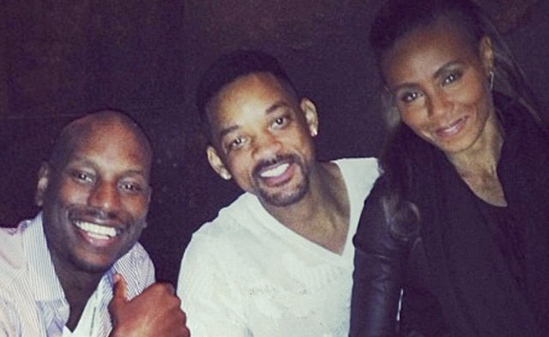We welcome back Vivien Brown to talk about her psychological drama, Lily Alone.
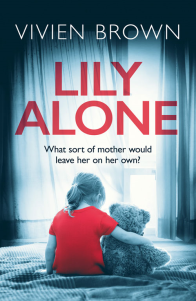 Hello Viv, and welcome back to the blog. We’ve known you for years as a short story writer and then a romance novelist. Why the change to psychological drama?
Hello Viv, and welcome back to the blog. We’ve known you for years as a short story writer and then a romance novelist. Why the change to psychological drama?
I did self-publish a novel called Losing Lucy under the name of Vivien Hampshire some years back, which looked at the trauma and emotional impact on three women when a baby gets kidnapped, so harrowing tales involving young children have been lurking under the surface for a while! Lily Alone does have a couple of romance threads running through it but it’s more than that. Perhaps it’s me getting older, or having children and a grandchild of my own, but I felt it was time to explore the deeper aspects of family relationships and take on more serious issues. Lily Alone has also allowed me to explore a different and more complex structure for a novel, as alternate chapters are told through the eyes and memories of a confused woman in a coma.
Lily Alone covers some traumatic material. Was it difficult to write?
Surprisingly not! I have a grandchild coming up to Lily’s age, and it would be horrible to imagine her having to cope at home by herself, but the novel was always fiction to me. None of it ‘got to me’ or upset me, even though parts of the story brought tears to my editor’s eyes and might just unnerve a few readers. It’s that ‘This could so easily happen to me’ aspect, I think.
What kind of research did Lily Alone entail?
I had to do a lot more research than I would for a romance novel, looking at what a very young child can and might do if left alone for a lengthy period of time, what happens to a head trauma/coma patient in hospital, and how the Social Services system works when a child is found abandoned, but luckily I have friends and family with all the right expertise to guide me.

Viv’s romance novel
Tell us about your writing day. Are you a night owl, a morning lark, or neither?
For years, I had to fit writing around a day job and my family, so I would always head upstairs to write at around 9pm, after the children were asleep, and dinner/chores/my fix of TV soap operas were out of the way. Since giving up my job at the end of 2013, in theory I have all the time in the world, but often still find my natural writing instincts kick in during the evening, although it is really handy to have time in the day to get all the non-creative aspects of the writing life, like emails, social media and admin, sorted. When I am heavily into writing or editing a novel, I will write at any time, putting everything else aside, for hours at a time and often without a break, but that is at peak times, and it’s tiring. It is not the norm.
What do you find is the hardest aspect of being a writer? Or is it all good?
I am not very disciplined. When there is a deadline or I am caught up in a story, I will want to write above all else, but on other days I do sometimes have to force myself. Being at home full-time now does tend to throw distractions in my way, whether it’s a sunny garden, food, something on daytime TV or having my granddaughter over for the day. Mostly, I love being a writer – creating something complete and that I feel proud of from just an initial idea, meeting other writers, seeing my stories and articles in print, and receiving the occasional royalty cheque! I can’t wait to see Lily Alone in paperback later in the year, as my previous novels have only been published as ebooks, and I want a ‘real’ novel to hold.
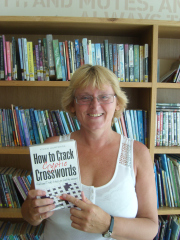
Viv with her cryptic crossword book
What do you like to do in your spare time?
I have always loved cryptic crosswords. I rarely get through a day without tackling at least one, usually in a newspaper so I can try for a prize. I have had a book published helping others learn how to crack them, and I also compile personalised and themed crosswords on a commission basis which people can then give to their loved ones as unique gifts for birthdays, Christmas, etc. I read an awful lot (mainly women’s fiction), go to see boy bands in concert, follow horseracing, and have two adorable cats.
You’ve been in the writing game many years now. If you could tell your younger writing self anything, what would it be?
Yes, I have been writing women’s magazine fiction as Vivien Hampshire for twenty years, and professional articles for childcare and nursery magazines for around ten. It took me a long while to move into novels with any success, so I would have to just tell her ‘Don’t give up!’ Keep writing as much and as often as you can, experiment with all types of writing ( I have also had success writing poetry for children, wrote a monthly column for Writers Forum magazine for two years, and I’ve won a few competitions), join writing groups and meet others in the same boat, listen and learn. Perseverance is the one thing writers need above all else. You cannot just rely on luck.
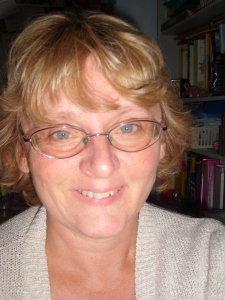 What’s next for Vivien Brown?
What’s next for Vivien Brown?
Lily Alone is the first in a two-book contract with Harper Impulse, so I will now be talking to my editor about book two, which is more or less written but not yet accepted and a long way from being edited. Although limited time means that I have given up writing my nursery articles for now, I will still be writing short stories for the magazines whenever I can fit them in. It is what I am good at, and I still very much enjoy telling a story in just one or two thousand words, and the satisfying feeling of getting a sale and payment so soon after it is written! Novels, unfortunately, don’t work that way. I have recently been commissioned by two women’s magazines to write stories for their October issues to tie in with the paperback version of Lily Alone coming out, and those will run alongside short interviews, book reviews and giveaways, so my long association with magazine fiction is now paying off when it comes to promoting the novel. I have also tentatively started another romance novel, but I have a feeling it may stray into darker territory as I get further into the story. And, yes, there is a baby involved – again!
Vivien’s Twitter page
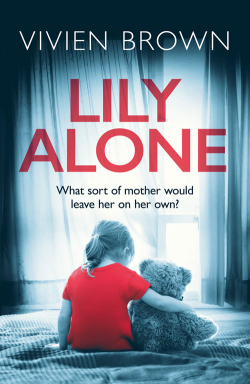 What sort of mother would leave her daughter alone?
What sort of mother would leave her daughter alone?
Would you leave a very young child at home on their own – knowing that terrible things can happen in the blink of an eye? Lily, who is not yet three years old, wakes up alone with only her cuddly toy for company. She is hungry, afraid of the dark, can’t use the phone, and has been told never to open the door to strangers…
In the flat downstairs, a lonely and elderly woman keeps herself to herself but wonders at the cries coming from upstairs. Lily’s grandmother frets that she can no longer see her granddaughter since the child’s parents separated. Lily’s father hasn’t seen her for a while. He’s been abroad, absorbed in his new job and his new girlfriend…
A young woman lies in a coma in hospital – no one knows her name or who she is, but in her silent dreams, a little girl is crying for her mummy…
And for Lily, time is running out.
Published by Harper Impulse and available from Amazon
Advertisements Share this:



